Failing to plan = Planning to fail (Benjamin Franklin)
Up to this point, after three years of studying abroad and only three months away from graduation, there have been many times where I have scolded myself, saying “well, there are things that if I had known since freshman year, things would have been very different. !”. Today, I will share some of the highlights.
Notes:
- The things listed below are purely my personal experiences and experiences: my orientation, my profession, my interests. Please read carefully before applying anything to yourself.
- Because I went to study abroad, I just posted the title above, but in fact, the following things will apply to any student, any major, anywhere.
- The things listed below are things that I have not been able to/have not done thoroughly.
- The following order is random, not based on importance.
#1: Read, A Lot!
The first two years in Finland were a wonderful time for me. Making friends, working hard, playing sports, partying, sucking trips here and there. It can be said that home is just a place to sleep – I go to school early, eat, study, play, do all kinds of activities there and only come home late at night. I do everything I can at school.
Except for one thing that I spend very little time on, and only do when the deadline is tight.
That was going to the library and reading, studying, researching.
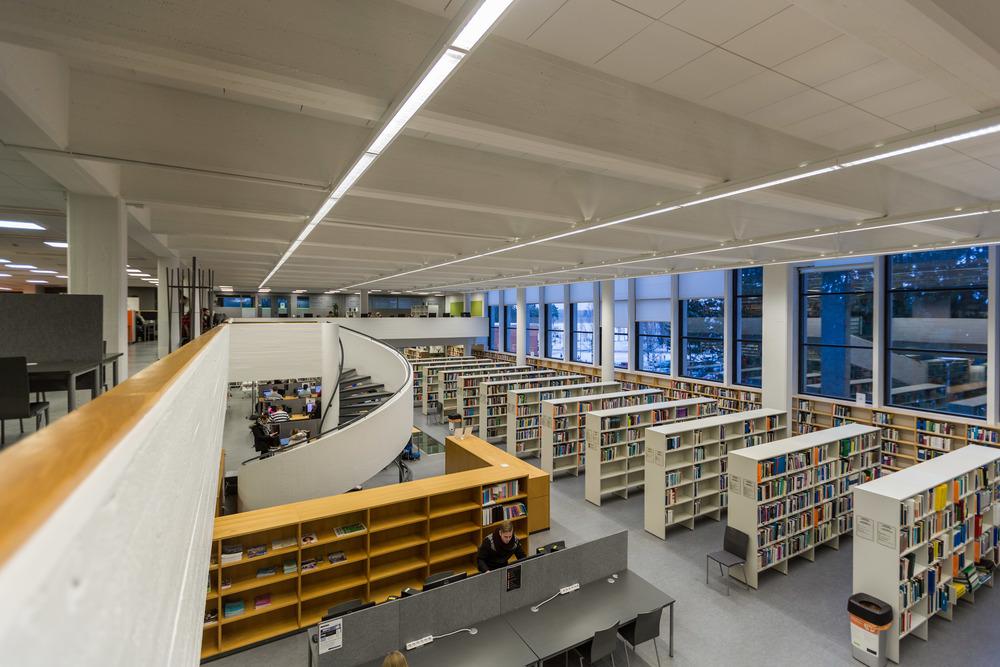
It was only when the pandemic broke out across the globe in March 2020, sweeping away all my plans for trips, parties, friends… that I realized the following:
- European universities have their reasons for converting one credit of course (ECTS) to 28 hours of study, including classwork and self-study. In addition to a few hours in class, the rest of the time is the responsibility of the students to explore and delve deeper into the subject. Most students do not realize this or are not disciplined enough to force themselves into the flow, so they feel that in Europe “study easy, study little”, just run deadlines, presentations, and final exams. done. The fact is that the reports, presentations, and final exams here are not too difficult, even there are only formal exams – the main thing that makes a student have outstanding knowledge and skills. lies in their deepening, self-study.
- Not saying anyone is far away, I was a prime example of not having an effective study method. I used to have the misconception that: because the subjects at school are easy, the best way to put pressure on yourself and promote knowledge development is to “embrace” a lot of subjects at the same time. This is a method used by many diligent students, because it makes them busier, creating the feeling that they are “harder” than other friends. This way also has the plus point of shortening the learning process, but the long-term trade-off will be: you will not be able to absorb and remember much, because all your time has been spent “ploughing” deadlines, reeling from submission deadlines, not giving you a reasonable amount of time to acquire knowledge for yourself. Not to mention, after reeling from a bunch of subjects, you won’t have any energy left for activities other than passive entertainment such as eating, sleeping, playing games…
Facts that many students who rarely go to the library will not realize, are:
- The library is the most powerful weapon when you are just a toddler in the classroom: Precious, expensive, limited quantities… are classified, information, and delivered to you quickly, neatly, free.
- You can extract documents, books, stories, support… not only in the school library, but also in all the major libraries in the world (linked with the school you attend). Later, when you graduate, your ability to access this valuable source of knowledge will be extremely limited and expensive.
Granted, university is not only a place to study, but also a miniature society, where you expand your relationships, have more friends, and explore the world around you. However, university is also the place where the “learning force” in each person’s life is at the highest level. Therefore, there needs to be a balance between these two extremes. For me, the first two years in Finland were completely socially skewed, so even though I’ve been through more than half of the learning curve, my knowledge is still just scratching the surface.
That day, seeing some of my friends reading at the library all day long, I laughed and asked why are you studying so hard? Looking back now, I’m sad to wonder why I didn’t take the time to study intensively earlier?
For me, reading and self-study are almost the same thing. If you follow the academic and research path, to gain in-depth knowledge from previous scholars, reading is paramount:
- No speaker, a video tutorial (indirect learning) can convey knowledge to you better than your brain can read and acquire knowledge by itself (direct learning). Because of this, the professor’s lectures in class are secondary, and self-study after class has a great influence.
- Reading skills need to be practiced. Important documents, reports and documents will be long, complex, and flowery. If you do not practice reading, it will be easy to get discouraged, read through speakers, not grasp the idea, leading to nothing to learn.
- The importance of reading books, everyone who has studied Social Discourse in grade 9 already knows.
So, the rest of my time at university (online) is devoted to knowledge accumulation, research, – all of which includes reading and self-study.
#2: Learn IT
One of my biggest mistakes when studying Business, majoring in Finance is: Business people don’t need to be good at IT.
I used to think that the most important thing for business students is to understand the discipline, financial mechanisms, and macroeconomics. When working with numbers, just being good at MS-Office, SAP, Oracle… is enough. The “sublime” things like programming languages, data analysis, IoT… are “pagans”, the playground of the Math-Information block.
But now, when you are living, studying and working in the 4.0 Era, where everything is based on algorithms, data and analysis, my above concept is not only very outdated, but also contains lazy, not adapted to the modern.
In the age of technology, a high-quality worker must not only understand what he wants to achieve, how to do it, but also know how to take advantage of technology to optimize his work.
A cafe owner needs to understand business management software (MS-Power BI) to capture revenue, costs, customer traffic, and service quality. A Marketing staff must know how to use SEO, Google Analytics … to analyze the potential customer traffic that is targeted. And a Finance learner must be fluent in Data Analysis, know how to extract Big data to find the true trend of an investment type, through IBM SPSS, Python, R…
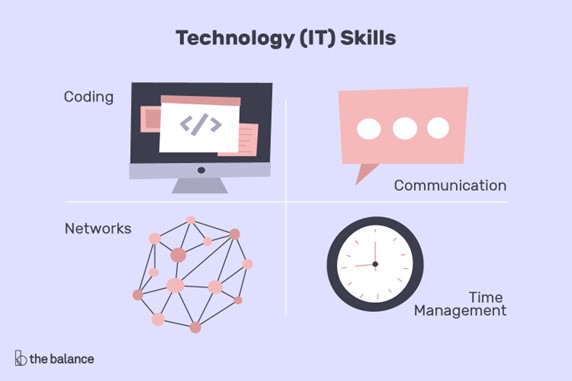
And this is something I used to take lightly. Mostly because I don’t actively learn. Partly because the business program in Finland does not facilitate or guide students to delve into this field (at the bachelor’s level). It was only when I came to Germany (less than a year ago), that I was “specialized shock” when I saw that my friends under the Finance major in Germany were introduced to Probability Mathematics, programming languages, and data analysis. very early (at the end of the first year), accompanied by a program that is both heavy and practical (reading a lot of documents, manipulating many Informatics programs …) because in Germany, the university’s top priority is to stick to reality, teaching students exactly what modern business is asking for. After a year of diligently pursuing the program, studying with my classmates, I have acquired the amount of IT skills that I could have acquired very early, if I had been properly oriented.
Lesson learned: When starting a university program, at the same time find out how far the field and profession you pursue have advanced and modernized. Start learning IT from that starting point.
#3: Do exercise
This is something that I fortunately realized before going to study abroad and persistently practicing until now.
It is a disturbing fact that Vietnamese people are among the world’s least active in sports. This leads to the following consequences, both in the short and long term:
- Pathology: Being prone to non-communicable diseases such as cardiovascular disease, cancer and diabetes.
- Appearance: Sick or overweight, easily sleepy, tired, lack of vitality.
- Less productivity, need more rest and nap.
What is more remarkable, is that international students, or students away from home in general, will tend to combine not exercising with equally harmful habits such as staying up late or through the night, convenient eating/eating unhealthy, sitting/lying down too much, using technology devices in moderation…
When I was still in Vietnam, I myself was quite interested in sports, regularly going to the gym, swimming and playing badminton. When I came to Finland, my daily sport habits were strengthened and expanded to include subjects that I had little chance to practice before, such as basketball, volleyball, tennis, running, Muay Thai, and table tennis. , Aerobic…And here’s why:
- Health training will give you a sharp mind; Blood circulation leads to less fatigue, more enthusiasm, better memory. This directly supports learning and other projects.
- In an era when people are easily distracted by billions of surrounding factors, playing sports will regenerate the ability to focus and solve problems, reduce the rate of distraction, give up halfway.
- Exercise helps me have more friends, because here almost everyone plays a certain sport very often. Sports also help me to be active and strong, not inferior to my friends in the world.
- (For me only hehe) Sports make me feel stronger, more “manly”, because then I can help and protect others. Or you can run away when needed 😀
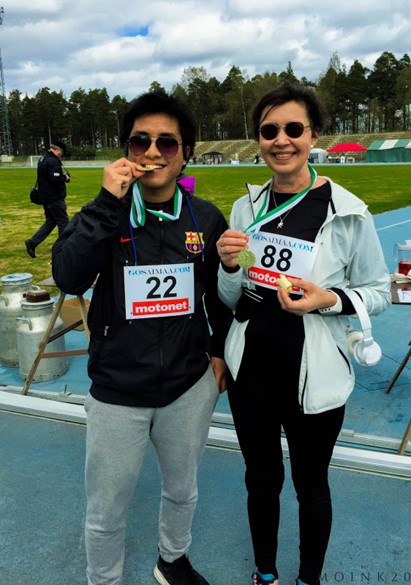
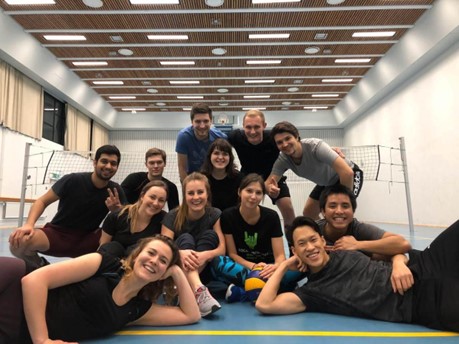
For me, enjoying life is only truly complete when I have “a clear mind in a strong body”.
#4: Saving and Investing
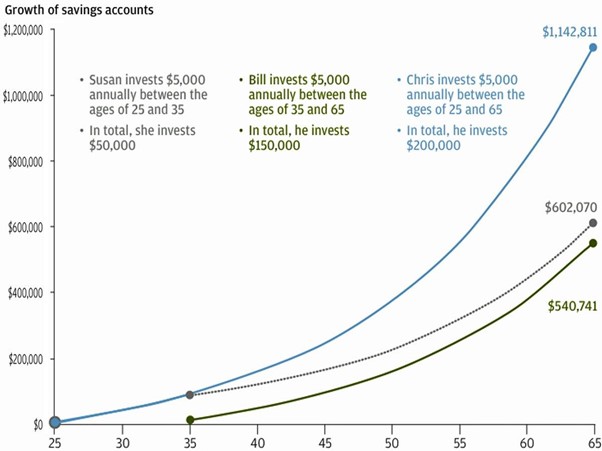
What do you see in the chart above?
It is an obvious fact that not many people realize: the earlier we accumulate – no matter how small -, the results will be greater than the accumulation of older people.
Those of you who have the desire to get rich, have financial freedom, retire early, or simply want a stable life in terms of money, have food to eat, take care of your family, you must have watched consider investment options.
To talk about investing, I will need to do a series of articles and will never be able to finish. So in the framework of this article, I just summarize as follows:
- Investment, means you provide resources (usually money) to a person/project/company/country, so that they generate surplus value. Just like you plant a seed, and many years later you will have the tree, with its shade and its sweet fruit.
- Because of the sustainable and long-term value of an investment, you need to learn about it as soon as possible, and do it as soon as possible. Whether you want to have fruit at 30 or wait until you’re 70, depends on whether you start today or not.
- Invest with solid knowledge, careful observation, and a cool head.
- One dollar you save = one profit. Live frugally, spend wisely, and remember that a dollar today can bring back ten dollars tomorrow if you use it right.
Ending
These are valuable lessons that I wish I had known before I started studying abroad. Hope this article can help you 😉

Khanh Tran

